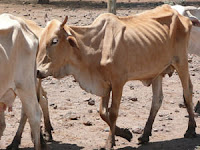A reader recently commented on a piece I wrote on vegetarianism and vitamin/protein deficiency. She said I was wrong when I commented that people should “drop the vegetarian thing” if they wanted to improve their health. She said she the vegetarians she knows are “extremely healthy,” as they eat eggs, cheese, and some even fish. She essentially asked me if she’s missing the point, or is it just me that’s crazy (just kidding, Caroline).
By all means I stand by my original point: It is difficult for vegetarians to get sufficient protein. Now I’m not saying there are no healthy vegetarians–that would be ludicrous; but I will say that many vegetarians I have met don’t appear as healthy-looking to me. Does that mean they are not healthy? No. It’s just an observation. However, saying that, I do look at people all day, almost every day–I am paid to evaluate health. But can I prove my observations? No.
What I am quite certain of is that vegetarians, like all people, need a proper intake of protein on a daily basis. As far as I know, eating fish is not vegetarian, so we don’t have to discuss that any further. But, yes, an ovo-lacto vegetarian should probably be okay, provided he or she is getting enough protein every day.
My reader was right when she pointed out that people who eat no meat, fish, eggs or dairy are called vegans. These people need to get their protein from vegetable sources–beans, avocados, nuts, grains, and so on. Everybody needs a minimum amount of protein every day (women 46 grams of protein per day, men 56 grams), therefore each meal should contain some.
Since we can all anecdotally speak of whom we know or what our personal experiences are, let it be stated that mine are just opinions. But since opinions are like…well, you know…I’ve got one too, and I am not afraid to share it.
Yes, vegetarians are often skinny. Big deal! Skinny ain’t health. In fact, for people that exercise, children and teens, and pregnant/lactating women, protein is needed big-time. I wouldn’t recommend vegetarianism (sorry, veganism) to any of these groups unless it’s a part of a long-standing cultural practice. For Americans that have picked up vegetarianism for their political beliefs (call it humanitarian, call it what you will), if you are in one of the groups mentioned above–well, I wouldn’t do it.
So my original article was in response to a woman that called me about her 17-year-old daughter who was having some cognitive difficulties. She suspected vitamin deficiency, and was asking about vitamin testing. HELLO! Seventeen-year-old girl, mother concerned about vitamin deficiency? I stand by my assessment and would say it again and again and again (oh…I guess I am now)–DROP THE VEGETARIANISM. Give that girl a steak, send her to the gym, slap a little sense into the little princess–you are too young to be playing with your health that way. The American Dietetic Association and Dietitians of Canada warn that poorly planned vegan diets can be deficient in vitamin B12, iron, vitamin D, calcium, iodine, and omega-3 fatty acids.
We have canine teeth for a reason. Duh! We are meant to eat a variety of foods, meat included. Yes, vegetarians can survive. They are skinny (couldn’t have anything to do with that in a seventeen-year-old girl, now could it?). But healthy? Don’t know. I certainly wouldn’t take the chance with my daughters.
But hey…for some people their politics is their religion. Wouldn’t eat a slaughtered animal but no problem eating a plant violently pulled from the ground, removed from it’s life source. Imagine that…taking the life of a living thing. Or should plant life be minimized? To the people that vehemently (and for some, violently) oppose meat eating, pick up a biology book and learn something about the life cycle–life must consume life–crazy thing that.
For those that want to be vegetarians, please…go ahead. But when it comes to your kids’ health, make sure they do it the right way, that’s all.
Thank you Caroline for stimulating my thoughts…or rant…whichever.


















